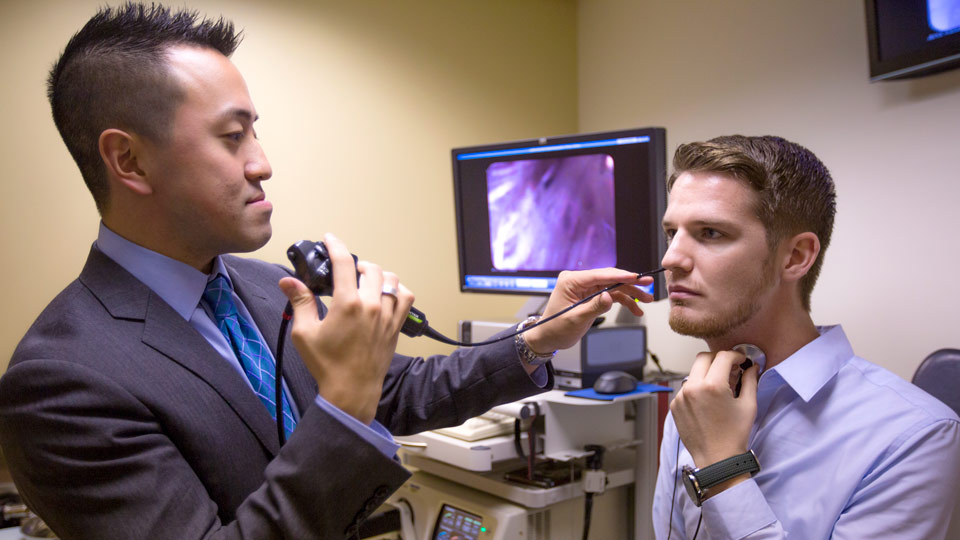Discovering the Area of Otolaryngology: What to Anticipate When You Speak With an ENT
Otolaryngology, frequently referred to as ENT, includes the medical diagnosis and treatment of nose, ear, and throat disorders. For those experiencing related concerns, getting in touch with an ENT professional can supply clarity and relief. Recognizing what to anticipate during such assessments is vital for efficient interaction and treatment. This introduction will certainly outline vital elements of the ENT experience, including usual factors for visits and the processes associated with diagnosis and treatment.

Recognizing Otolaryngology: A Summary
Otolaryngology, typically described as ENT (Throat, ear, and nose) medicine, is a specialized branch of medicine that concentrates on the diagnosis and therapy of problems affecting these crucial locations of the body. This area includes a wide variety of problems, including those associated to hearing, balance, respiratory feature, and speech. Otolaryngologists are educated to handle both medical and clinical therapies, utilizing sophisticated strategies and technologies. Their knowledge extends past standard conditions, dealing with problems such as allergic reactions, sinus infections, and hearing loss. Additionally, they play an essential duty in the management of head and neck cancers cells, giving complete care customized to individual client demands. Overall, otolaryngology continues to be important for maintaining health and lifestyle in affected individuals.
Usual Factors to See an ENT Expert
Lots of individuals seek the proficiency of an ENT expert for a range of factors, reflecting the varied nature of conditions that affect the ear, throat, and nose. Common concerns include persistent sinusitis, which often leads to consistent nasal congestion and face discomfort. Allergies and their associated signs, such as itching and sneezing, likewise prompt sees to these specialists (Otolaryngology). Hearing loss, whether sudden or gradual, is another considerable factor for examination. Furthermore, individuals might seek evaluation for throat disorders, consisting of relentless hoarseness or ingesting troubles. Rest apnea, defined by interrupted breathing throughout sleep, is regularly resolved by ENT professionals. Each of these conditions highlights the relevance of specialized care in handling intricate ENT-related health issues
Planning for Your ENT Visit
When preparing for an ENT visit, it is important to gather appropriate details and consider any kind of particular issues. Clients need to assemble an in-depth clinical background, consisting of previous ear, nose, or throat problems, surgeries, and existing drugs. Recording signs-- such as duration, seriousness, and regularity-- can give beneficial insights for the ENT specialist. Furthermore, people must prepare a list of questions they want to ask, making sure that all concerns are resolved throughout the see. Bringing along any appropriate clinical documents or test results can additionally aid the ENT in comprehending the patient's problem. People ought to validate their appointment details, consisting of location, time, and date, to reduce any type of last-minute confusion. Correct preparation can boost the effectiveness of the appointment and lead to much better outcomes.
What to Anticipate During the Appointment
As the appointment begins, the patient can anticipate to involve in a detailed discussion with the ENT professional about their signs and symptoms and case history. The professional will make inquiries about the period, regularity, and severity of signs such as hearing loss, nasal congestion, or sore throat. In addition, the patient's previous medical problems, drugs, and any type of appropriate family background will be examined, aiding the professional in developing a full understanding of the patient's wellness. The ENT might likewise inquire about way of living aspects, such as exposure to toxic irritants or irritants. This open dialogue develops a structure for the examination, guaranteeing that the individual's concerns are resolved and establishing the phase for any type of necessary assessments or referrals for treatment.
Analysis Tests and Procedures in Otolaryngology
A variety of analysis examinations and treatments are crucial in otolaryngology to accurately evaluate and identify problems affecting the ear, throat, and nose. Usual examinations include audiometry, which gauges hearing function, and tympanometry, examining middle ear stress. Nasal endoscopy allows visualization of the nasal flows dan gordon ent and sinuses, while laryngoscopy checks out the throat and vocal cables. Imaging strategies, such as CT scans and MRIs, offer in-depth sights of head and neck structures. Allergic reaction testing might likewise be conducted to recognize triggers for sinus or breathing problems. These analysis tools allow ENT experts to establish a comprehensive understanding of individuals' problems, ensuring tailored and reliable administration strategies. Proper medical diagnosis is crucial for effective treatment end results in otolaryngology.
Therapy Choices Supplied by ENT Specialists
ENT experts provide a range of treatment alternatives customized to deal with certain problems influencing the nose, throat, and ear. These therapies range from conventional approaches, such as medicine and way of living adjustments, to even more intrusive treatments. Allergic reactions might be taken care of with antihistamines or immunotherapy, while persistent sinusitis may require nasal corticosteroids or sinus surgical treatment. For hearing loss, ENT experts typically suggest listening devices or medical treatments like cochlear implants. In cases of throat discover this info here disorders, choices can include speech therapy or operations to get rid of blockages. Additionally, they may supply assistance for handling rest apnea, consisting of the use of CPAP tools or surgical interventions. Generally, the goal is to enhance patients' high quality of life through personalized care and efficient treatment techniques.
When to Look For Follow-Up Care With an ENT
Identifying when to look for follow-up treatment with an ENT expert is essential for managing ongoing signs or issues related to nose, ear, and throat conditions. Patients should take into consideration scheduling a follow-up consultation if symptoms linger despite initial treatment, such as chronic ear discomfort, nasal congestion, or throat discomfort. Adjustments in hearing, balance issues, or uncommon nasal discharge may likewise call for additional examination. In addition, if a patient experiences adverse effects from prescribed medicines or has actually gone through a procedure, follow-up care is necessary to check recuperation and address any type of problems. Timely appointments can guarantee effective administration of conditions, avoid possible problems, and supply tranquility of mind concerning one's wellness. Looking for follow-up care advertises positive health management in otolaryngology.
Regularly Asked Inquiries

What Certifications Should I Look for in an ENT Professional?
When seeking an ENT professional, one should seek board qualification, relevant experience, and solid person evaluations. In addition, reliable interaction skills and a thoughtful approach can greatly boost the overall therapy experience.
How Do I Select the Right ENT for My Needs?
Selecting the appropriate ENT professional includes evaluating their certifications, experience, and client evaluations (ENT surgery). It is necessary to contemplate their interaction design and strategy check this site out to therapy, ensuring they line up with the individual's details wellness demands and choices
Are There Any Kind Of Threats Connected With ENT Procedures?
The dangers connected with ENT procedures might consist of infection, bleeding, anesthetic issues, and prospective damages to bordering structures. Clients should review these risks with their medical professional to comprehend individual worries and assurance informed decisions.
Exactly How Can I Manage Anxiousness Prior To My ENT Appointment?
To handle anxiousness before a consultation, people can practice deep breathing workouts, envision positive results, prepare questions beforehand, and seek assistance from friends or family, promoting a feeling of peace of mind and calmness.
What Should I Do if I Experience Negative Effects From Therapy?
The individual ought to quickly report them to their healthcare supplier if side impacts from therapy happen. Adjustments to treatment or extra treatments may be needed to guarantee safety and effectiveness in handling their condition - Hearing. As the consultation begins, the person can anticipate to engage in a detailed discussion with the ENT expert concerning their signs and symptoms and clinical history. These analysis devices enable ENT professionals to develop an extensive understanding of individuals' problems, ensuring tailored and reliable monitoring plans. ENT professionals offer a variety of therapy choices customized to address particular conditions influencing the ear, nose, and throat. When looking for an ENT specialist, one must look for board certification, relevant experience, and solid person reviews. Selecting the appropriate ENT expert involves assessing their credentials, experience, and client evaluations